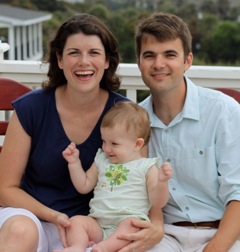In Life and in Death We Belong to God: Are there Babysitters in Heaven? – by Meg Peery McLaughlin

I got a phone call from a young mom a couple of weeks ago asking me how to talk to her elementary-aged daughter about death. It wasn’t because her child was acutely grieving the loss of a loved one, but rather a curiosity about what happens when someone dies. Honestly and humbly, this mother had patiently answered her daughter’s questions. They talked about how everybody dies. Sometimes it is older people whose bodies stop working. They talked about people who die suddenly from accidents or illnesses. They talked about how, yes, even babies sometimes die. Upon this realization, the little girl wondered aloud if there were babysitters in heaven. For if a baby can die and their mommy or daddy aren’t in heaven yet, then who will take care of them? It was at this point that the mom called me.
As a Pastor of Pastoral Care at a larger congregation, I’ve averaged a funeral every other week for the past six years. I’ve watched children climb around hospitals beds pointing out catheters and IV drips, as parents have explained how bodies weren’t working anymore. I’ve seen young siblings bring balloons to the memorial garden and tell me that their baby brother is with Jesus. I’ve released ashes over the side of the mountain and heard a grandchild ask, almost immediately, “can I go have some hot chocolate now.” This congregation has taught me some important lessons about death.
-Talk straight. It’s best to be open with kids when the topic comes up and their questions arise. Be honest and as clear/concrete as possible. Kids don’t need to be shielded from the truth. If they are, their imaginations will fill in details where there are gaps. Avoid clichés: “God takes people” makes it seem like God is like the descending metal claw in a toy machine. “Grandma went to sleep and is now in heaven” makes me never want to put my own head on a pillow. “We go to a better place” makes me wonder what’s so bad about the world I’m living in – the one that everyone said God made. “I promise everything will be okay” sounds reassuring, but I’d rather hear that you promise to love me no matter what happens.
-Magical thinking is an intergenerational activity. Joan Didion, after the death of her husband, wrote a great book called The Year of Magical Thinking. Her portrait of grief describes the way that she felt like she could control things with wishful thinking. Didion confessed she really did wonder if her husband would come back if she didn’t give away his shoes (he might come back and need them, after all). Kids, especially kids six years old and younger, live in that kind of world, too. Young kids can think death is reversible. Kids can think that their thoughts/actions/words were the cause of death, or could bring their loved ones back.
-State the obvious. . . again and again and again. Why do you think we come to worship week after week after week to hear gospel words, watch the waters of baptism slosh in the font, experience the table in the middle of room? We all need reminders of what is right and what is real. Kids do too. Tell them: Death is not their fault. It’s not the deceased person’s fault. Love doesn’t go away. You’re glad the person doesn’t hurt anymore. It’s not fair. God’s heart is sad too. When they ask again, answer.
-Let kids see your love. After all, that’s the same thing as letting them see your grief. Love and grief are intertwined and never do we get rid of/get over/ have closure with either. It’s okay to bring kids with you when you visit the sick. It’s okay to bring kids with you to the funeral. It’s okay to let them bring balloons to the cemetery. It’s okay to let them see you cry. It’s okay to talk about those who are no longer in our reach. There is great danger in turning to your kids to have them be your therapist, but there is great wisdom in letting your kids see your process. Where else will they learn to grieve? To love? To honor father and mother? To be neighbor? To trust that in life and in death we belong to God? A worth while read about engendering faith to our kids can be found at: http://www.breadnotstones.com/2012/05/ten-things-i-want-to-tell-parents.html.
 Get comfortable in deep water. Most of what I’m asked about by parents are deep water questions. Will there be babysitters in heaven? Will I recognize my loved one? Who will be married up there—grandmom and granddad or grandmom and stepgranddad? How does all this work? I find immeasurable comfort in the way the Apostle Paul treads water here. In 1 Corinthians 15, in his efforts to talk about the resurrection of the body and the life everlasting, he says; “Listen, let me tell you a mystery!” I love that. “Listen Up! I’m about to talk to you about what NONE OF US really actually knows!” There’s some permission giving here: tell your kids you don’t know the answer, tell your kids about mystery. But also dream about what’s beneath your toes. Imagine together about what heaven would be like—knowing what you do know about love, about God’s desire to bind us into community, about Easter morning and Christmas Eve, about your own experience of faith. Realizing that you’re in the midst of mystery doesn’t need to mean that you fall silent, but rather that you can stand in awe with your kid and practice the holy art of imagination.
Get comfortable in deep water. Most of what I’m asked about by parents are deep water questions. Will there be babysitters in heaven? Will I recognize my loved one? Who will be married up there—grandmom and granddad or grandmom and stepgranddad? How does all this work? I find immeasurable comfort in the way the Apostle Paul treads water here. In 1 Corinthians 15, in his efforts to talk about the resurrection of the body and the life everlasting, he says; “Listen, let me tell you a mystery!” I love that. “Listen Up! I’m about to talk to you about what NONE OF US really actually knows!” There’s some permission giving here: tell your kids you don’t know the answer, tell your kids about mystery. But also dream about what’s beneath your toes. Imagine together about what heaven would be like—knowing what you do know about love, about God’s desire to bind us into community, about Easter morning and Christmas Eve, about your own experience of faith. Realizing that you’re in the midst of mystery doesn’t need to mean that you fall silent, but rather that you can stand in awe with your kid and practice the holy art of imagination.
Parents ask me about good books to read with their kids about death. There are some good ones. Union Presbyterian Seminary has a blog that reviews Children’s Literature. (http://storypath.wordpress.com — search “death” within the site). But if you want to get to the core about my own theology of death, a go-to for me is Margaret Wise Brown’s The Runaway Bunny. Whether with young kids who can appreciate it immediately, or older kids who may remember it from their early childhood, that book speaks of an inescapable love—an inescapable love that is akin to the inescapable love of God in Christ Jesus our Lord. If you read that book alongside Psalm 139: 1-12, you might think Brown was plagiarizing; plagiarizing in the most holy way possible. What better way to say that no matter where we go—in life or in death—we belong to God, like a bunny belongs to his mother? Who needs a babysitter then?


Love this post. I find your tips (be truthful, be magical, and echo Scripture in a tangible way) are how we’ve discussed the adoption of our Congolese children to my kids living in our house right now. The why don’t they have a Mommy and Daddy anymore? Because people die. Doesn’t this make God sad? Very. That’s why God sent Jesus, so that through Easter morning He could begin to make the sad things untrue. Will you die and leave me too? One day. Hopefully not until I’m very old and you have your own children. But because we trust in Jesus, we can look forward to the day when all the sad things are untrue. When there will be no more death, or crying, or broken toys, or orphans. In truth, I often wonder when we all get to heaven, who will be the mom of my kids? I suspect we will all be family and it will all be wonderful.
I often used another Margaret Wise Brown reference. I believe the title was “The Dead Bird”. The children found a dead bird and had a proper burial. The final line (as I recall was) “And they went back (to the grave) every day, until they forgot.” Grief may ever end is a good corrective to the culture’s illusion of “closure”.
Meg, wise and compassionate words. I rate Runaway Bunny as one of the theological classics of our time, next to Karl Barth and Sallie McFague. You reminded me that I once preached from it (in conjunction with Romans 8). The use of holy imagination in the midst of mystery is key. Thanks, from your former professor.
Meg, What a wonderful and insightful document. I am sure you get many questions. I have told children that when someone dies we feel sad because we will miss them. God has welcomed them to heaven and we will see them again. Will my dog, cat, horse, gerbil be in heaven? Heaven is such a wonderful place and you will be completely happy there. So if you want or need your pet to be there of be happy your pet will be there. I have thought I wished my loved ones could come back to earth, but then realized why would they want to since they are completely happy in heaven. So I continue to believe that, in life and death we belong to God. That is a comfort for me.
Thank you for being who you are.
sandee
Pingback: Friday Link Love « The Blue Room
Meg, your words are so insightful. I read with tears my eyes. I agree with all the comments wholeheartedly. Thanks to you and Cynthia!
Thanks Meg. My kids & grand kids are grown, but when those greats come along I will use your insightful thoughts to help answer those unexpected questions that I’m sure will arise. You’re the best.
Beautifully and thoughtfully written, friend.
This was wonderful and insightful. Thanks for being so honest and insightful, Meg.